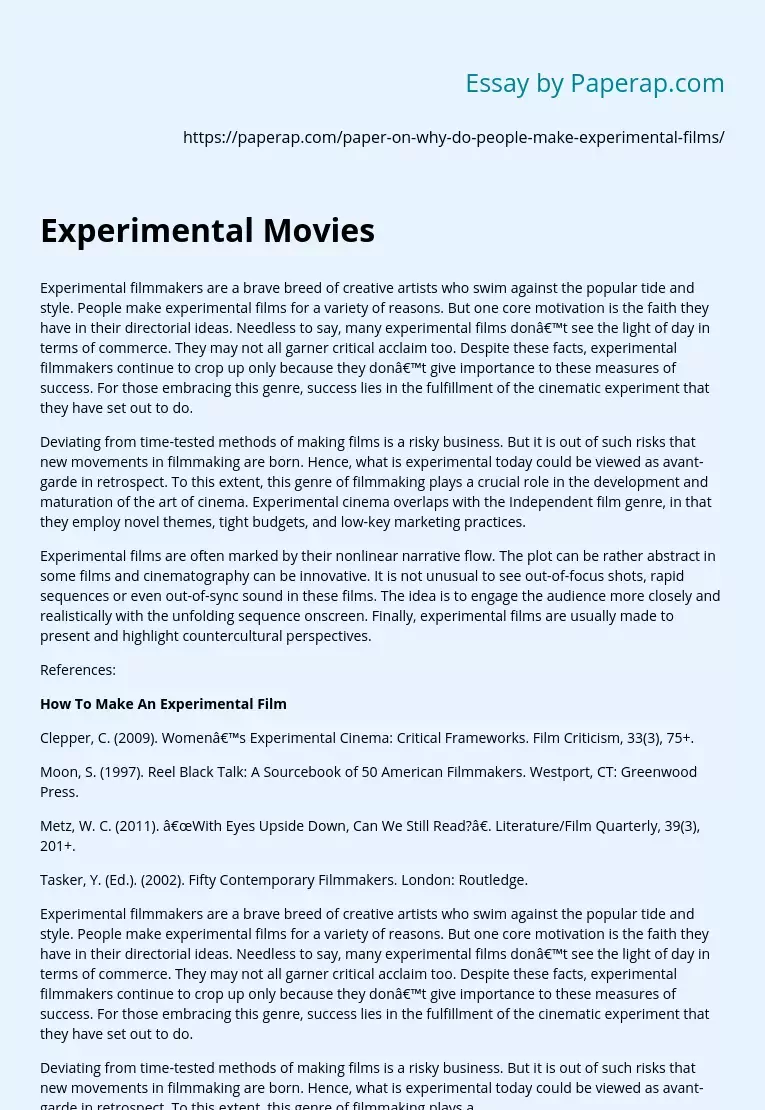Experimental Movies
Experimental filmmakers are a brave breed of creative artists who swim against the popular tide and style. People make experimental films for a variety of reasons. But one core motivation is the faith they have in their directorial ideas. Needless to say, many experimental films don’t see the light of day in terms of commerce. They may not all garner critical acclaim too. Despite these facts, experimental filmmakers continue to crop up only because they don’t give importance to these measures of success.
For those embracing this genre, success lies in the fulfillment of the cinematic experiment that they have set out to do.
Deviating from time-tested methods of making films is a risky business. But it is out of such risks that new movements in filmmaking are born. Hence, what is experimental today could be viewed as avant-garde in retrospect. To this extent, this genre of filmmaking plays a crucial role in the development and maturation of the art of cinema.
Experimental cinema overlaps with the Independent film genre, in that they employ novel themes, tight budgets, and low-key marketing practices.
Experimental films are often marked by their nonlinear narrative flow. The plot can be rather abstract in some films and cinematography can be innovative. It is not unusual to see out-of-focus shots, rapid sequences or even out-of-sync sound in these films. The idea is to engage the audience more closely and realistically with the unfolding sequence onscreen. Finally, experimental films are usually made to present and highlight countercultural perspectives.
References:
How To Make An Experimental Film
Clepper, C. (2009). Women’s Experimental Cinema: Critical Frameworks. Film Criticism, 33(3), 75+.
Moon, S. (1997). Reel Black Talk: A Sourcebook of 50 American Filmmakers. Westport, CT: Greenwood Press.
Metz, W. C. (2011). “With Eyes Upside Down, Can We Still Read?”. Literature/Film Quarterly, 39(3), 201+.
Tasker, Y. (Ed.). (2002). Fifty Contemporary Filmmakers. London: Routledge.
Experimental filmmakers are a brave breed of creative artists who swim against the popular tide and style. People make experimental films for a variety of reasons. But one core motivation is the faith they have in their directorial ideas. Needless to say, many experimental films don’t see the light of day in terms of commerce. They may not all garner critical acclaim too. Despite these facts, experimental filmmakers continue to crop up only because they don’t give importance to these measures of success. For those embracing this genre, success lies in the fulfillment of the cinematic experiment that they have set out to do.
Deviating from time-tested methods of making films is a risky business. But it is out of such risks that new movements in filmmaking are born. Hence, what is experimental today could be viewed as avant-garde in retrospect. To this extent, this genre of filmmaking plays a crucial role in the development and maturation of the art of cinema. Experimental .
Experimental Movies. (2019, Dec 05). Retrieved from https://paperap.com/paper-on-why-do-people-make-experimental-films/

